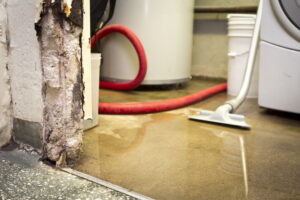A boiler is an ideal home heating solution. It’s highly effective, providing very even heating throughout the home. It can last longer than any other heating system—sometimes thirty years compared to a gas furnace’s fifteen! And with fewer moving parts than a furnace, it encounters fewer problems and is less likely to require repairs.
It is true, however, that nothing can last for decades without ever needing some professional help. And unlike other heating systems, your boiler uses water to distribute the heat it creates. One of the most common problems a boiler can encounter is leaking. If you’re concerned about water below your boiler, here’s what you need to know.
Pressure Problems
The most likely source of water leaking from your boiler is the pressure release valve. In the case of a small amount of water, you probably don’t have a problem at all. This valve modulates the amount of pressure inside the system by allowing a little bit of water through the valve. So if you’re seeing drips and not puddles, keep an eye on it, but don’t be too worried.
If a larger amount of water is coming from that pressure release valve, there is cause for concern. When water pressure gets too high, so that allowing a few drops out does not resolve the problem and more and more water is released, you need boiler repair in Kenilworth, NJ. A technician can “bleed” the system to adjust the overall pressure without risking water damage from constant leaks.
Loose Connections
Your boiler has joints or connections where the piping that carries the hot water throughout your house is connected to the tank of the boiler itself. If the water is coming from a connection point, this is a pretty serious concern, but can certainly be repaired.
The heating and cooling of the system means that these parts are continually expanding and contracting. This can, over time, lead to loosening of the joints or even, in rare cases, cracking. It’s also possible that poorly done soldering from a past repair is allowing water to leak through. Your heating technician can determine the exact cause and take appropriate action to stop the leak.
Age and Corrosion
The third possible cause of the leaking is the most serious. Damage to the structural integrity of the boiler tank itself cannot be repaired. If the tank is corroded and rusting, or beginning to crack, you will see water coming from the tank itself and not a joint or pressure release valve. The water may even be discolored from rust.
This is extremely unusual in a boiler that has not yet reached advanced age. It takes a long time for corrosion to damage the body of the tank, because it has a special rust-resistant coating. It’s actually gas furnaces that will experience corrosion much sooner than boilers, even though they don’t contain water!
If the water is coming from the tank, or you’re not sure where it’s coming from but the boiler is well over 20 years of age, it’s likely that you will have to replace your boiler. The good news is that there are amazing new models available, some of which are much more efficient than your aging boiler, and once it’s replaced, you’ll have a reliable system that will keep you warm for decades.
A member of our team would be happy to discuss your boiler with you.
Established in 1912, Max Sr & Paul Schoenwalder Plumbing, Heating and Air Conditioning, A Corp. is your trusted resource for knowledgeable gas fireplace installation. Reach out to us today.

